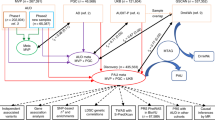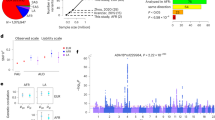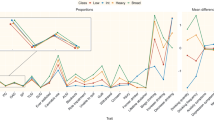Abstract
Traumatic life experiences are associated with alcohol use problems, an association that is likely to be moderated by genetic predisposition. To understand these interactions, we conducted a gene-by-environment genome-wide interaction study (GEWIS) of alcohol use problems in two independent samples, the Army STARRS (STARRS, N=16 361) and the Yale-Penn (N=8084) cohorts. Because the two cohorts were assessed using different instruments, we derived separate dimensional alcohol misuse scales and applied a proxy-phenotype study design. In African-American subjects, we identified an interaction of PRKG1 rs1729578 with trauma exposure in the STARRS cohort and replicated its interaction with trauma exposure in the Yale-Penn cohort (discovery-replication meta-analysis: z=5.64, P=1.69 × 10−8). PRKG1 encodes cyclic GMP-dependent protein kinase 1, which is involved in learning, memory and circadian rhythm regulation. Considering the loci identified in stage-1 that showed same effect directions in stage-2, the gene ontology (GO) enrichment analysis showed several significant results, including calcium-activated potassium channels (GO:0016286; P=2.30 × 10−5), cognition (GO:0050890; P=1.90 × 10−6), locomotion (GO:0040011; P=6.70 × 10−5) and Stat3 protein regulation (GO:0042517; P=6.4 × 10−5). To our knowledge, this is the largest GEWIS performed in psychiatric genetics, and the first GEWIS examining risk for alcohol misuse. Our results add to a growing body of literature highlighting the dynamic impact of experience on individual genetic risk.
This is a preview of subscription content, access via your institution
Access options
Subscribe to this journal
Receive 12 print issues and online access
$259.00 per year
only $21.58 per issue
Buy this article
- Purchase on Springer Link
- Instant access to full article PDF
Prices may be subject to local taxes which are calculated during checkout


Similar content being viewed by others
References
Walsh K, Elliott JC, Shmulewitz D, Aharonovich E, Strous R, Frisch A et al. Trauma exposure, posttraumatic stress disorder and risk for alcohol, nicotine, and marijuana dependence in Israel. Compr Psychiatry 2014; 55: 621–630.
Kline A, Weiner MD, Ciccone DS, Interian A St, Hill L, Losonczy M . Increased risk of alcohol dependency in a cohort of National Guard troops with PTSD: a longitudinal study. J Psychiatr Res 2014; 50: 18–25.
Goldman D, Oroszi G, Ducci F . The genetics of addictions: uncovering the genes. Nat Rev Genet 2005; 6: 521–532.
Gelernter J, Kranzler HR, Sherva R, Almasy L, Koesterer R, Smith AH et al. Genome-wide association study of alcohol dependence:significant findings in African- and European-Americans including novel risk loci. Mol Psychiatry 2014; 19: 41–49.
Polimanti R, Zhang H, Smith AH, Zhao H, Farrer LA, Kranzler HR et al. Genome-wide association study of body mass index in subjects with alcohol dependence. Addict Biol 2015 e-pub ahead of print 12 October 2015; doi:10.1111/adb.12317.
Polimanti R, Wang Q, Meda SA, Patel KT, Pearlson GD, Zhao H et al. The interplay between risky sexual behaviors and alcohol dependence: genome-wide association and neuroimaging support for LHPP as a risk gene. Neuropsychopharmacology 2016; 42: 598–605.
Polimanti R, Kranzler HR, Gelernter J . Phenome-wide association study for alcohol and nicotine risk alleles in 26394 women. Neuropsychopharmacology 2016; 41: 2688–2696.
Sartor CE, Wang Z, Xu K, Kranzler HR, Gelernter J . The joint effects of ADH1B variants and childhood adversity on alcohol related phenotypes in African-American and European-American women and men. Alcohol Clin Exp Res 2014; 38: 2907–2914.
Turecki G, Ota VK, Belangero SI, Jackowski A, Kaufman J . Early life adversity, genomic plasticity, and psychopathology. Lancet Psychiatry 2014; 1: 461–466.
Mehta D, Klengel T, Conneely KN, Smith AK, Altmann A, Pace TW et al. Childhood maltreatment is associated with distinct genomic and epigenetic profiles in posttraumatic stress disorder. Proc Natl Acad Sci USA 2013; 110: 8302–8307.
Lieberman R, Armeli S, Scott DM, Kranzler HR, Tennen H, Covault J . FKBP5 genotype interacts with early life trauma to predict heavy drinking in college students. Am J Med Genet B Neuropsychiatr Genet 2016; 171: 879–887.
Baranger DA, Ifrah C, Prather AA, Carey CE, Corral-Frias NS, Drabant Conley E et al. PER1 rs3027172 genotype interacts with early life stress to predict problematic alcohol use, but not reward-related ventral striatum activity. Front Psychol 2016; 7: 464.
Kaufman J, Yang BZ, Douglas-Palumberi H, Crouse-Artus M, Lipschitz D, Krystal JH et al. Genetic and environmental predictors of early alcohol use. Biol Psychiatry 2007; 61: 1228–1234.
Gelernter J . Genetics of complex traits in psychiatry. Biol Psychiatry 2015; 77: 36–42.
Hart AB, Lynch KG, Farrer L, Gelernter J, Kranzler HR . Which alcohol use disorder criteria contribute to the association of ADH1B with alcohol dependence? Addict Biol 2016; 21: 924–938.
Rietveld CA, Esko T, Davies G, Pers TH, Turley P, Benyamin B et al. Common genetic variants associated with cognitive performance identified using the proxy-phenotype method. Proc Natl Acad Sci USA 2014; 111: 13790–13794.
Ursano RJ, Colpe LJ, Heeringa SG, Kessler RC, Schoenbaum M, Stein MB et al. The Army study to assess risk and resilience in servicemembers (Army STARRS). Psychiatry 2014; 77: 107–119.
Kessler RC, Ustun TB . The World Mental Health (WMH) Survey Initiative Version of the World Health Organization (WHO) Composite International Diagnostic Interview (CIDI). Int J Methods Psychiatr Res 2004; 13: 93–121.
Stein MB, Chen CY, Ursano RJ, Cai T, Gelernter J, Heeringa SG et al. Genome-wide association studies of posttraumatic stress disorder in 2 cohorts of US army soldiers. JAMA Psychiatry 2016; 73: 695–704.
Polimanti R, Chen CY, Ursano RJ, Heeringa SG, Jain S, Kessler RC et al. Cross-phenotype polygenic risk score analysis of persistent post-concussive symptoms in U.S. army soldiers with deployment-acquired traumatic brain injury. J Neurotrauma 2017; 34: 781–789.
Gelernter J, Kranzler HR, Sherva R, Koesterer R, Almasy L, Zhao H et al. Genome-wide association study of opioid dependence: multiple associations mapped to calcium and potassium pathways. Biol Psychiatry 2014; 76: 66–74.
Sherva R, Wang Q, Kranzler H, Zhao H, Koesterer R, Herman A et al. Genome-wide association study of cannabis dependence severity, novel risk variants, and shared genetic risks. JAMA Psychiatry 2016; 73: 472–480.
Gelernter J, Kranzler HR, Sherva R, Almasy L, Herman AI, Koesterer R et al. Genome-wide association study of nicotine dependence in American populations: identification of novel risk loci in both African-Americans and European-Americans. Biol Psychiatry 2015; 77: 493–503.
Gelernter J, Sherva R, Koesterer R, Almasy L, Zhao H, Kranzler HR et al. Genome-wide association study of cocaine dependence and related traits: FAM53B identified as a risk gene. Mol Psychiatry 2014; 19: 717–723.
Pierucci-Lagha A, Gelernter J, Chan G, Arias A, Cubells JF, Farrer L et al. Reliability of DSM-IV diagnostic criteria using the Semi-Structured Assessment for Drug Dependence and Alcoholism (SSADDA). Drug Alcohol Depend 2007; 91: 85–90.
Pierucci-Lagha A, Gelernter J, Feinn R, Cubells JF, Pearson D, Pollastri A et al. Diagnostic reliability of the Semi-Structured Assessment for Drug Dependence and Alcoholism (SSADDA). Drug Alcohol Depend 2005; 80: 303–312.
Cuthbert BN, Insel TR . Toward the future of psychiatric diagnosis: the seven pillars of RDoC. BMC Med 2013; 11: 126.
Insel T, Cuthbert B, Garvey M, Heinssen R, Pine DS, Quinn K et al. Research Domain Criteria (RDoC): toward a new classification framework for research on mental disorders. Am J Psychiatry 2010; 167: 748–751.
Montalvo-Ortiz JL, Gelernter J, Hudziak J, Kaufman J . RDoC and translational perspectives on the genetics of trauma-related psychiatric disorders. Am J Med Genet B Neuropsychiatr Genet 2016; 171B: 81–91.
Chang CC, Chow CC, Tellier LC, Vattikuti S, Purcell SM, Lee JJ . Second-generation PLINK: rising to the challenge of larger and richer datasets. Gigascience 2015; 4: 7.
Chen MH, Yang Q . GWAF: an R package for genome-wide association analyses with family data. Bioinformatics 2010; 26: 580–581.
Willer CJ, Li Y, Abecasis GR . METAL: fast and efficient meta-analysis of genomewide association scans. Bioinformatics 2010; 26: 2190–2191.
Ward LD, Kellis M . HaploReg v4: systematic mining of putative causal variants, cell types, regulators and target genes for human complex traits and disease. Nucleic Acids Res 2016; 44: D877–D881.
Wang J, Duncan D, Shi Z, Zhang B . WEB-based GEne SeT AnaLysis Toolkit (WebGestalt): update 2013. Nucleic Acids Res 2013; 41 (Web Server issue): W77–W83.
Keller MC . Gene x environment interaction studies have not properly controlled for potential confounders: the problem and the (simple) solution. Biol Psychiatry 2014; 75: 18–24.
Roadmap Epigenomics Consortium Roadmap Epigenomics Consortium Kundaje A, Roadmap Epigenomics Consortium Meuleman W, Roadmap Epigenomics Consortium Ernst J, Roadmap Epigenomics Consortium Bilenky M, Roadmap Epigenomics Consortium Yen A et al. Integrative analysis of 111 reference human epigenomes. Nature 2015; 518: 317–330.
Encode Project Consortium. An integrated encyclopedia of DNA elements in the human genome. Nature 2012; 489: 57–74.
Polimanti R, Yang C, Zhao H, Gelernter J . Dissecting ancestry genomic background in substance dependence genome-wide association studies. Pharmacogenomics 2015; 16: 1487–1498.
Trynka G, Raychaudhuri S . Using chromatin marks to interpret and localize genetic associations to complex human traits and diseases. Curr Opin Genet Dev 2013; 23: 635–641.
Hofmann F, Wegener JW . cGMP-dependent protein kinases (cGK). Methods Mol Biol 2013; 1020: 17–50.
Lohmann SM, Walter U . Tracking functions of cGMP-dependent protein kinases (cGK). Front Biosci 2005; 10: 1313–1328.
Kleppisch T, Feil R . cGMP signalling in the mammalian brain: role in synaptic plasticity and behaviour. Handb Exp Pharmacol 2009; 191: 549–579.
Corradini E, Vallur R, Raaijmakers LM, Feil S, Feil R, Heck AJ et al. Alterations in the cerebellar (Phospho)proteome of a cyclic guanosine monophosphate (cGMP)-dependent protein kinase knockout mouse. Mol Cell Proteomics 2014; 13: 2004–2016.
Langmesser S, Franken P, Feil S, Emmenegger Y, Albrecht U, Feil R . cGMP-dependent protein kinase type I is implicated in the regulation of the timing and quality of sleep and wakefulness. PLoS One 2009; 4: e4238.
Ota KT, Pierre VJ, Ploski JE, Queen K, Schafe GE . The NO-cGMP-PKG signaling pathway regulates synaptic plasticity and fear memory consolidation in the lateral amygdala via activation of ERK/MAP kinase. Learn Mem 2008; 15: 792–805.
Paul C, Schoberl F, Weinmeister P, Micale V, Wotjak CT, Hofmann F et al. Signaling through cGMP-dependent protein kinase I in the amygdala is critical for auditory-cued fear memory and long-term potentiation. J Neurosci 2008; 28: 14202–14212.
Zhang YW, Rudnick G . Myristoylation of cGMP-dependent protein kinase dictates isoform specificity for serotonin transporter regulation. J Biol Chem 2011; 286: 2461–2468.
Osborne KA, Robichon A, Burgess E, Butland S, Shaw RA, Coulthard A et al. Natural behavior polymorphism due to a cGMP-dependent protein kinase of Drosophila. Science 1997; 277: 834–836.
Urquhart-Cronish M, Sokolowski MB . Gene-environment interplay in Drosophila melanogaster: chronic nutritional deprivation in larval life affects adult fecal output. J Insect Physiol 2014; 69: 95–100.
Burns JG, Svetec N, Rowe L, Mery F, Dolan MJ, Boyce WT et al. Gene-environment interplay in Drosophila melanogaster: chronic food deprivation in early life affects adult exploratory and fitness traits. Proc Natl Acad Sci USA 2012; 109 (Suppl 2): 17239–17244.
Caplan SL, Milton SL, Dawson-Scully K . A cGMP-dependent protein kinase (PKG) controls synaptic transmission tolerance to acute oxidative stress at the Drosophila larval neuromuscular junction. J Neurophysiol 2013; 109: 649–658.
Ashley-Koch AE, Garrett ME, Gibson J, Liu Y, Dennis MF, Kimbrel NA et al. Genome-wide association study of posttraumatic stress disorder in a cohort of Iraq-Afghanistan era veterans. J Affect Disord 2015; 184: 225–234.
Cadet JL, Brannock C, Krasnova IN, Jayanthi S, Ladenheim B, McCoy MT et al. Genome-wide DNA hydroxymethylation identifies potassium channels in the nucleus accumbens as discriminators of methamphetamine addiction and abstinence. Mol Psychiatry 2016 e-pub ahead of print 5 April 2016; doi:10.1038/mp.2016.48.
You L, Wang Z, Li H, Shou J, Jing Z, Xie J et al. The role of STAT3 in autophagy. Autophagy 2015; 11: 729–739.
Stojkov NJ, Baburski AZ, Bjelic MM, Sokanovic SJ, Mihajlovic AI, Drljaca DM et al. In vivo blockade of alpha1-adrenergic receptors mitigates stress-disturbed cAMP and cGMP signaling in Leydig cells. Mol Hum Reprod 2014; 20: 77–88.
Acknowledgements
This study was funded by National Institutes of Health grants R21 AA024404, RC2 DA028909, R01 DA12690, R01 DA12849, R01 DA18432, R01 AA11330, R01 AA017535, P50 AA012870, the VISN1 and VISN4 MIRECCs. We would like to thank an anonymous reviewer for the findings of the KEGG-pathway enrichment analysis. Army STARRS was sponsored by the Department of the Army and funded under cooperative agreement number U01MH087981 (2009-2015) with the U.S. Department of Health and Human Services, National Institutes of Health, National Institute of Mental Health (NIH/NIMH). Subsequently, STARRS-LS was sponsored and funded by the Department of Defense (USUHS grant number HU0001-15-2-0004). The contents are solely the responsibility of the authors and do not necessarily represent the views of the Department of Health and Human Services, NIMH, or the Department of the Army, or the Department of Defense. The Army STARRS Team consists of Co-Principal Investigators: Robert J. Ursano, MD (Uniformed Services University of the Health Sciences) and Murray B. Stein, MD, MPH (University of California San Diego and VA San Diego Healthcare System); Site Principal Investigators: Steven Heeringa, PhD (University of Michigan), James Wagner, PhD (University of Michigan) and Ronald C. Kessler, PhD (Harvard Medical School); Army liaison/consultant: Kenneth Cox, MD, MPH (USAPHC (Provisional)); Biomarker Working Group Chair: Murray B. Stein, MD, MPH (University of California San Diego and VA San Diego Healthcare System); Biomarker Working Group: Susan Borja, PhD (NIMH); Tianxi Cai, ScD (Harvard School of Public Health); Chia-Yen Chen, ScD (Harvard Medical School); Joel Gelernter, MD (Yale University); Sonia Jain, PhD (University of California San Diego); Kevin Jensen, PhD (Yale University); Kristen Jepsen, PhD (University of California San Diego); Ronald C. Kessler, PhD (Harvard Medical School); Douglas Meinecke, PhD (NIMH); Colter Mitchell, PhD (University of Michigan); Caroline Nievergelt, PhD (University of California San Diego); Rema Raman, PhD (University of California San Diego); Jordan W. Smoller, MD, ScD (Harvard Medical School); Michael L. Thomas, PhD (University of California San Diego); Robert J. Ursano, MD (Uniformed Services University of the Health Sciences); Christina L. Wassel, PhD (University of Pittsburgh); Erin Ware, PhD (University of Michigan); Lei Zhang, MD (Uniformed Services University of the Health Sciences); Biomarker Working Group Consultants: Karestan Koenen, PhD (Columbia University); Ronen Segman, MD (Hadassah University Hospital, Israel); Stephan Ripke, MD (Harvard Medical School); Nadia Solovieff, PhD (Harvard Medical School); Other team members: Pablo A. Aliaga, MA (Uniformed Services University of the Health Sciences); COL David M. Benedek, MD (Uniformed Services University of the Health Sciences); Laura Campbell-Sills, PhD (University of California San Diego); Carol S. Fullerton, PhD (Uniformed Services University of the Health Sciences); Nancy Gebler, MA (University of Michigan); Robert K. Gifford, PhD (Uniformed Services University of the Health Sciences); Paul E. Hurwitz, MPH (Uniformed Services University of the Health Sciences); Sonia Jain, PhD (University of California San Diego); Tzu-Cheg Kao, PhD (Uniformed Services University of the Health Sciences); Lisa Lewandowski-Romps, PhD (University of Michigan); Holly Herberman Mash, PhD (Uniformed Services University of the Health Sciences); James E. McCarroll, PhD, MPH (Uniformed Services University of the Health Sciences); James A. Naifeh, PhD (Uniformed Services University of the Health Sciences); Tsz Hin Hinz Ng, MPH (Uniformed Services University of the Health Sciences); Matthew K. Nock, PhD (Harvard University); Nancy A. Sampson, BA (Harvard Medical School); CDR Patcho Santiago, MD, MPH (Uniformed Services University of the Health Sciences); LTC Gary H. Wynn, MD (Uniformed Services University of the Health Sciences); and Alan M. Zaslavsky, PhD (Harvard Medical School).
Author information
Authors and Affiliations
Corresponding author
Ethics declarations
Competing interests
In the past 3 years, Dr Stein has been a consultant for Actelion Pharmaceuticals, Healthcare Management Technologies, Janssen, Neurocrine, Pfizer, Resilience Therapeutics, Tonix Pharmaceuticals and Oxeia Biopharmaceuticals. Dr Kaufman has provided consultation to Pfizer and Merck Pharmaceutical Company to train investigators to assess bipolar disorder in youth. Dr Kranzler has been an advisory board member, consultant or CME speaker for Indivior, Lundbeck and Otsuka. He is also a member of the American Society of Clinical Psychopharmacology’s Alcohol Clinical Trials Initiative, which is supported by AbbVie, Alkermes, Ethypharm, Indivior, Lilly, Lundbeck, Pfizer and XenoPort. In the past 3 years, Dr Kessler received support for his epidemiological studies from Sanofi Aventis; was a consultant for Johnson & Johnson Wellness and Prevention, Shire, Takeda; and served on an advisory board for the Johnson & Johnson Services Inc. Lake Nona Life Project. Kessler is a co-owner of DataStat, Inc., a market research firm that carries out healthcare research. The remaining authors declare no conflict of interest.
Additional information
Supplementary Information accompanies the paper on the Molecular Psychiatry website
Supplementary information
PowerPoint slides
Rights and permissions
About this article
Cite this article
Polimanti, R., Kaufman, J., Zhao, H. et al. A genome-wide gene-by-trauma interaction study of alcohol misuse in two independent cohorts identifies PRKG1 as a risk locus. Mol Psychiatry 23, 154–160 (2018). https://doi.org/10.1038/mp.2017.24
Received:
Revised:
Accepted:
Published:
Issue Date:
DOI: https://doi.org/10.1038/mp.2017.24
This article is cited by
-
Problematic Alcohol Use Trajectories in U.S. Military Veterans during a Public Health Crisis: Results from a 3-year, Nationally Representative, Longitudinal Study
Psychiatric Quarterly (2024)
-
The cannabinoid receptor-1 gene interacts with stressful life events to increase the risk for problematic alcohol use
Scientific Reports (2022)
-
Multi-environment gene interactions linked to the interplay between polysubstance dependence and suicidality
Translational Psychiatry (2021)
-
Investigating Causality Between Blood Metabolites and Emotional and Behavioral Responses to Traumatic Stress: a Mendelian Randomization Study
Molecular Neurobiology (2020)
-
The Army Study to Assess Risk and Resilience in Servicemembers (Army STARRS): progress toward understanding suicide among soldiers
Molecular Psychiatry (2019)



